Hyundai Kona vs SEAT Leon SP Sportstourer - Differences and prices compared
Compare performance (218 HP vs 272 HP), boot space and price (23100 £ vs 25800 £ ) at a glance. Find out which car is the better choice for you – Hyundai Kona or SEAT Leon SP Sportstourer?
Costs and Efficiency:
When it comes to price and running costs, the biggest differences usually appear. This is often where you see which car fits your budget better in the long run.
Hyundai Kona has a somewhat advantage in terms of price – it starts at 23100 £ , while the SEAT Leon SP Sportstourer costs 25800 £ . That’s a price difference of around 2777 £.
Fuel consumption also shows a difference: SEAT Leon SP Sportstourer manages with 1.20 L and is therefore convincingly more efficient than the Hyundai Kona with 4.60 L. The difference is about 3.40 L per 100 km.
As for electric range, the Hyundai Kona performs decisively better – achieving up to 514 km, about 383 km more than the SEAT Leon SP Sportstourer.
Engine and Performance:
Power, torque and acceleration are the classic benchmarks for car enthusiasts – and here, some clear differences start to show.
When it comes to engine power, the SEAT Leon SP Sportstourer has a somewhat edge – offering 272 HP compared to 218 HP. That’s roughly 54 HP more horsepower.
In acceleration from 0 to 100 km/h, the Hyundai Kona is minimal quicker – completing the sprint in 7.80 s, while the SEAT Leon SP Sportstourer takes 7.90 s. That’s about 0.10 s faster.
In terms of top speed, the SEAT Leon SP Sportstourer performs hardly perceptible better – reaching 220 km/h, while the Hyundai Kona tops out at 210 km/h. The difference is around 10 km/h.
There’s also a difference in torque: SEAT Leon SP Sportstourer pulls distinct stronger with 360 Nm compared to 265 Nm. That’s about 95 Nm difference.
Space and Everyday Use:
Beyond pure performance, interior space and usability matter most in daily life. This is where you see which car is more practical and versatile.
Both vehicles offer seating for 5 people.
In curb weight, Hyundai Kona is minimal lighter – 1370 kg compared to 1384 kg. The difference is around 14 kg.
In terms of boot space, the SEAT Leon SP Sportstourer offers distinct more room – 620 L compared to 466 L. That’s a difference of about 154 L.
In maximum load capacity, the SEAT Leon SP Sportstourer performs a bit better – up to 1600 L, which is about 300 L more than the Hyundai Kona.
When it comes to payload, SEAT Leon SP Sportstourer a bit takes the win – 569 kg compared to 490 kg. That’s a difference of about 79 kg.
Who wins the race in the data check?
The SEAT Leon SP Sportstourer sits well ahead of its rival in the objective data comparison.
This result only shows which model scores more points on paper – not which of the two cars feels right for you.
Costs and Consumption
View detailed analysis
Engine and Performance
View detailed analysis
Dimensions and Body
View detailed analysis
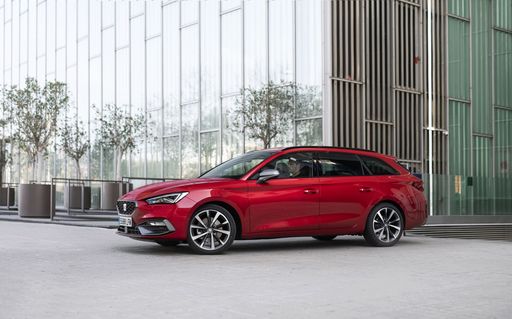
SEAT Leon SP Sportstourer
Hyundai Kona
The Hyundai Kona wears its personality on the outside with bold styling and sprightly handling that turns city driving into something a little more fun than a commute. It blends practical space, modern tech and sensible running costs into a compact, stylish package — a smart pick if you want flair without paying luxury prices.
details



SEAT Leon SP Sportstourer
The SEAT Leon Sportstourer blends sporty hatchback looks with estate practicality, giving buyers a sleek wagon that doesn't look like it's trying too hard to be sensible. Its cabin feels modern and well thought‑out, with clever storage and a driving character that keeps the journey entertaining — a smart choice for families who don't want to surrender style for space.
details
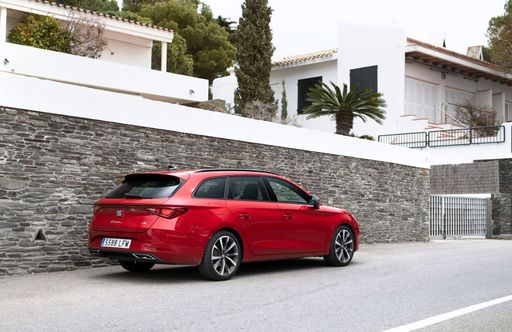
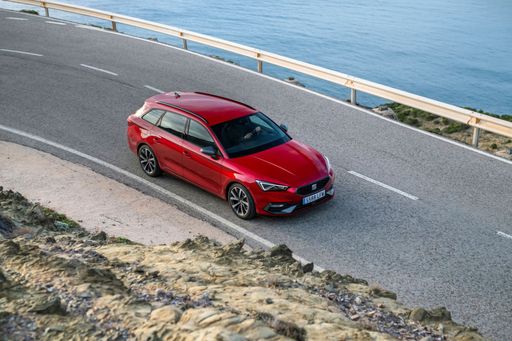
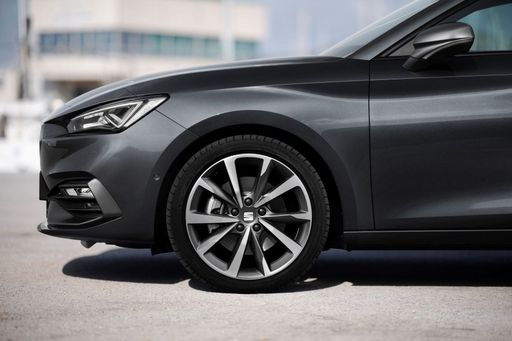
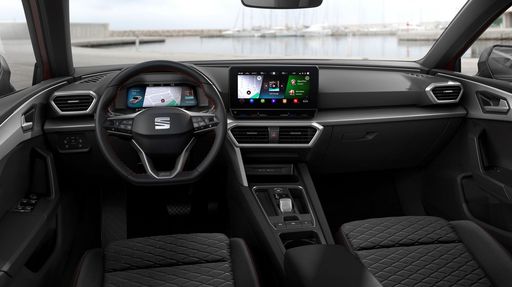
Costs and Consumption |
|
|---|---|
|
Price
23100 - 41600 £
|
Price
25800 - 37900 £
|
|
Consumption L/100km
4.6 - 7 L
|
Consumption L/100km
1.2 - 5.6 L
|
|
Consumption kWh/100km
14.6 - 16.8 kWh
|
Consumption kWh/100km
-
|
|
Electric Range
377 - 514 km
|
Electric Range
131 km
|
|
Battery Capacity
1.3 - 65.4 kWh
|
Battery Capacity
19.70 kWh
|
|
co2
0 - 163 g/km
|
co2
28 - 128 g/km
|
|
Fuel tank capacity
38 - 47 L
|
Fuel tank capacity
40 - 45 L
|
Dimensions and Body |
|
|---|---|
|
Body Type
SUV
|
Body Type
Estate
|
|
Seats
5
|
Seats
5
|
|
Doors
5
|
Doors
5
|
|
Curb weight
1370 - 1773 kg
|
Curb weight
1384 - 1708 kg
|
|
Trunk capacity
466 L
|
Trunk capacity
470 - 620 L
|
|
Length
4350 - 4385 mm
|
Length
4642 mm
|
|
Width
1825 mm
|
Width
1799 mm
|
|
Height
1580 - 1585 mm
|
Height
1437 - 1456 mm
|
|
Max trunk capacity
1300 L
|
Max trunk capacity
1450 - 1600 L
|
|
Payload
420 - 490 kg
|
Payload
422 - 569 kg
|
Engine and Performance |
|
|---|---|
|
Engine Type
Electric, Petrol, Full Hybrid
|
Engine Type
Petrol, Petrol MHEV, Diesel, Plugin Hybrid
|
|
Transmission
Automatic, Manuel
|
Transmission
Manuel, Automatic
|
|
Transmission Detail
Reduction Gearbox, Manual Gearbox, Dual-Clutch Automatic
|
Transmission Detail
Manual Gearbox, Dual-Clutch Automatic
|
|
Drive Type
Front-Wheel Drive, All-Wheel Drive
|
Drive Type
Front-Wheel Drive
|
|
Power HP
115 - 218 HP
|
Power HP
115 - 272 HP
|
|
Acceleration 0-100km/h
7.8 - 11.9 s
|
Acceleration 0-100km/h
7.9 - 10.8 s
|
|
Max Speed
162 - 210 km/h
|
Max Speed
197 - 220 km/h
|
|
Torque
200 - 265 Nm
|
Torque
220 - 360 Nm
|
|
Number of Cylinders
3 - 4
|
Number of Cylinders
3 - 4
|
|
Power kW
85 - 160 kW
|
Power kW
85 - 200 kW
|
|
Engine capacity
998 - 1598 cm3
|
Engine capacity
1498 - 1968 cm3
|
General |
|
|---|---|
|
Model Year
2024 - 2025
|
Model Year
2024 - 2025
|
|
CO2 Efficiency Class
A, D, C, E, F
|
CO2 Efficiency Class
D, B
|
|
Brand
Hyundai
|
Brand
SEAT
|
Is the Hyundai Kona offered with different drivetrains?
Available configurations include Front-Wheel Drive or All-Wheel Drive.




